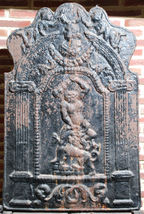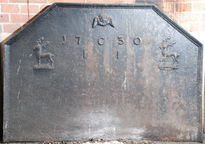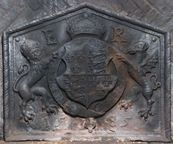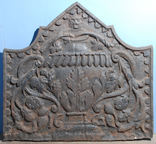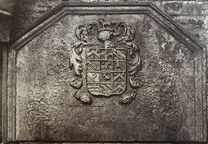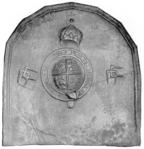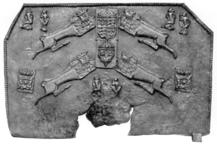-
45
Description: Rectangular; ovolo-moulded, gadrooned edging (top and sides); a vertical spindle or chair leg surmounted by a fleur-de-lys arranged three times; the date split by the middle fleur-de-lys.
Notes: The fleur-de-lys is separately stamped from the spindle, and the same spindle is seen on another fireback of the same date.
Inscription: 1641
- Decoration tags:
- rectangular (shape)
- gadrooned (edging)
- simple stamps
- carved stamps
- individual numbers
- heraldic
- text
- objects
Manufactured: in 1641 possibly at Cuckfield Furnace in the Weald area of England.
Current location: in private hands, Cuckfield, West Sussex, England.
- Attached to series:
- Spindle series
- Spindle/distaff firebacks
- Fleur-de-lys firebacks
-
46
Description: Ionic columns supporting a semi-circular arch, in the centre of which the bust of a man has a floral swag beneath; below is a quasi-arched rectangle of beads within which is the figure of Hercules, wielding a club, slaying the Nemean Lion; beneath are floral scrolls; on top of the main arch two kneeling putti hold a wreath over the bust.
Notes: Not the standard 'Dutch' type, which may indicate a different origin. Copies of this fireback were advertised in Burton Weir's (Rotherham) catalogue in the early-20th century.
Copies of this fireback are known.
- Decoration tags:
- 'Dutch' (shape)
- fillet (edging)
- whole carved pattern
- pictorial
- mythological
- animals
- humans
- objects
Manufactured: in the early- to mid-18th century in England.
Current location: in private hands, Cuckfield, West Sussex, England.
- Attached to series:
- Late pictorial series (all)
- Late pictorial series 6
-
47
Description: Rectangular with canted top corners; ovolo-moulded edging (except base); top centre, cherub face and wings; below, date separated by initials in triad on either side of which a stag statant on a chapeau.
Notes: The cherub is similar, but not identical to those on a fireback, of 1713, from Ashburnham, and the layout and edging are also similar.
Inscription: 17 ICI [triad] 30
- Decoration tags:
- rectangular with canted top corners (shape)
- ovolo (edging)
- carved stamps
- individual letters
- individual numbers
- heraldic
- text
- animals
- humans
Manufactured: in 1730 possibly at Ashburnham Furnace in the Weald area of England.
Current location: in private hands, Cuckfield, West Sussex, England.
- Attached to series:
- Miscellaneous stamp firebacks
-
40
Description: Pentagonal; convex, twisted cloth edging with inner fillet; Tudor royal shield, garter, crown and supporters (crowned lion and dragon); initials split by crown; date split by garter buckle.
Notes: Royal arms of Queen Elizabeth I; uncommon edging.
Inscription: E R / HONY SOIT QVI MAL Y PENSE / 1585
Arms: Tudor royal (Elizabeth I)
- Decoration tags:
- triangular arched (shape)
- convex, twisted cloth with inner fillet (edging)
- whole carved pattern
- individual numbers
- armorial
- royal
- text
Manufactured: in 1585 in the Weald area of England.
Current location: in private hands, Cuckfield, West Sussex, England.
- Attached to series:
- Elizabethan royal armorial firebacks
- Tudor royal armorial firebacks
-
41
Description: Arched rectangular shape; rope edging (top and sides); Tudor royal shield, garter, crown and supporters (crowned lion and dragon); date above crown; empty motto compartment with initials below.
Notes: Identical arms can be seen on fireback formerly at Baynards Park, Cranleigh (no. 200), and on one in private hands at Maresfield (no. 482), neither of which have the motto compartment; minor variations in the position of individual elements indicate that the garter and shield, crown, and each supporter were separately stamped; the initials are likely to be those of Henry Bowyer, ironmaster (d.1588), the fireback perhaps being made in his memory.
Inscription: 1588 HB
Arms: Tudor royal (Elizabeth I)
- Decoration tags:
- rectangular with round arch (shape)
- rope (edging)
- carved stamps
- individual letters
- individual numbers
- armorial
- royal
- text
- objects
Manufactured: in 1588 possibly at Pounsley Furnace, Framfield in the Weald area of England.
Current location: in private hands, Cuckfield, West Sussex, England.
-
49
Description: Rectangular with cavetto curves rising to corners and a ‘portico’ top; fillet edging with bas-relief, alternate regularly spaced semi-circles and triangles inside; two-handled flower vase with acanthus bas-relief, trailing vines issuing from top, with pomegranate and hop(?), descending through handles to base; lion’s head at top; date split either side of vase base.
Notes: The bas-relief edging also appears on other firebacks, suggesting the same pattern maker. The date was probably added separately. Formerly in Dallington, East Sussex. Burstow & Hewett auction, Battle, 3 Apr 2019, lot 1706 (£35).
Copies of this fireback are known.
Inscription: 1662
- Decoration tags:
- rectangular with canted top corners and triangular arch (shape)
- fillet (edging)
- whole carved pattern
- individual numbers
- pictorial
- text
- plants
- objects
Manufactured: in 1662 in the Weald area of England.
Current location: not known.
- Attached to series:
- Gadrooned vase firebacks
-
52
Description: Arch-shaped, the arch consisting of eight, straight, ovolo-moulded sections; longer ovolo-moulded pieces form the lower sides of the fireback; in the centre a circular garter enclosing the Tudor arms of England; above, a crown; the date was carved on a single stamp and placed left of the crown.
Notes: From other examples it is apparent that the crown is formed from a separate stamp to the shield and garter. Formerly at Knole, Sevenoaks, and later at Horton Court Lodge, Monks Horton, Kent.
Copies of this fireback are known.
Inscription: 1589 / HONI SOIT qVI MAL I PANSE
Arms: Tudor royal
- Decoration tags:
- multi-facet arched (shape)
- ovolo (edging)
- carved stamps
- date stamp
- armorial
- royal
- text
Manufactured: in 1589 possibly in the Weald area of England.
Current location: Dartford Museum, Dartford, Kent, England.
Museum number: 1938-141 (part of the Dartford Museum museum group)
- Attached to series:
- 1589 series
- Tudor royal armorial firebacks
-
335
Description: Canted rectangle; stepped edging; unidentified shield with 12 quarterings, helm and crest; arms carved on rectangular back board.
Notes: Two horizontal plank lines; arms over-stamped. Photographed at Messrs. C. Pannett & Sons, Highgate, Hawkhurst, Kent; from an album of photographs of firebacks by W. Galsworthy Davie c.1912 (National Art Library, Victoria and Albert Museum, London).
Copies of this fireback are known.
Arms: Not known
- Decoration tags:
- rectangular with canted top corners (shape)
- rebated fillet (edging)
- carved pattern panels
- planklines
- armorial
Manufactured: in the late-16th to early-17th century possibly in the Weald area of England.
Current location: not known.
Citation: Shuffrey, L. A., 1912, The English Fireplace, London, Batsford.
- Attached to series:
- Personal armorial firebacks
-
266
Description: Arch-shaped, the arch consisting of eight, straight, ovolo-moulded sections; longer ovolo-moulded pieces form the lower sides of the fireback; in the centre a circular garter enclosing the Tudor arms of England; above, a crown; irregularly spaced each side of the shield, a crossed staple stamp (the left one over-pressed).
Notes: The crossed staple stamp suggests a connection with the Nevill family. The crown is formed from a separate stamp to the shield and garter. Other variants are dated 1589. Recorded at Penshurst Place in 1903; illustration from Dawson 1903.
Inscription: HONI SOIT qVI MAL I PANSE
Arms: Tudor royal
- Decoration tags:
- multi-facet arched (shape)
- ovolo (edging)
- carved stamps
- heraldic
- armorial
- royal
Manufactured: in the late-16th century in the Weald area of England.
Current location: not known.
Citation: Dawson, C., 1903, 'Sussex Iron Work and Pottery', Sussex Archaeological Collections, 46, pp. 1-54.
Citation: Gardner, J. S., 1898, 'Iron Casting in the Weald', Archaeologia, 56, 1, pp. 133-164.
- Attached to series:
- 1589 series
- Tudor royal armorial firebacks
-
267
Description: Rectangular; twisted rope edging (top and sides); top centre, crowned Tudor royal shield (over-pressed) between a leopard passant guardant sinister (on the left) and a leopard passant (on the right); below, crowned shield bearing initials, KH, above a fleur-de-lys, between two further leopards, styles as above; below the lower shield, two 'imp' figures, the left one with both arms lowered, the right with its right arm raised; outside each lower leopard, a crowned rose (over-pressed); each top corner, a pair of ‘imp’ figures styles as before.
Notes: One of the 'Royal' series. Illustration from Dawson 1903. Formerly in the collection of Dr C. Prince, of Crowborough, Sussex. Further deterioration at the bottom of the casting has caused some loss of metal.
Inscription: KH
Arms: Tudor royal arms of England
- Decoration tags:
- rectangular with canted top corners (shape)
- rope (edging)
- carved stamps
- heraldic
- armorial
- animals
- humans
- plants
Manufactured: in the mid-16th century in the Weald area of England.
Current location: Leeds Castle, Leeds, Kent, England.
Citation: Balcomb, J. T., Nov. 1886, 'An Extinct Sussex Art', The Art Journal, pp. 337-340.
Citation: Dawson, C., 1903, 'Sussex Iron Work and Pottery', Sussex Archaeological Collections, 46, pp. 1-54.
Citation: Gardner, J. S., 1898, 'Iron Casting in the Weald', Archaeologia, 56, 1, pp. 133-164.
- Attached to series:
- Royal series

